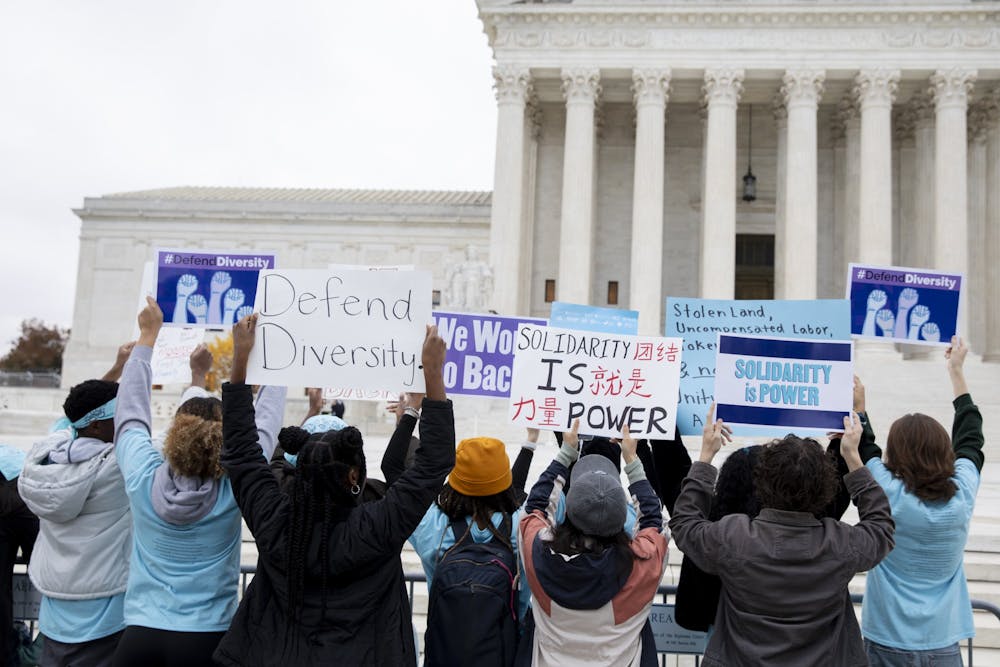The Court also ruled against Harvard College, a case originally consolidated against UNC, but separated in July after Justice Ketanji Brown Jackson recused herself for previous involvement at Harvard.
Because affirmative action is related to a government entity and the consideration of race, it is subject to strict scrutiny, the tightest level of review to prove constitutionality. Thus, in order for the Court to view the practice as constitutional, it must have been proven to reflect a compelling government interest and be narrowly tailored to that interest.
Roberts wrote that affirmative action fails strict scrutiny because the goals the universities presented were not judicially meaningful and because the universities' admissions programs didn't demonstrate a meaningful connection between the "means they employ and the goals they pursue."
Under a more than 20-year precedent first set in the 1978 case Regents of the University of California v. Bakke, colleges could consider race in their admissions processes as long as it was only an individualized, informal “plus” for an applicant, rather than part of a numeric quota for diversity.
This precedent, first confirmed in 2003, acknowledged affirmative action as a necessary, corrective system to racial inequality in higher education. The establishing case, however, recommended a 25-year limit on affirmative action — a limit that would have theoretically expired in five years.
During oral arguments, multiple justices questioned the University’s lack of a clear, quantitative off-ramp from race-conscious admissions, though UNC’s counsel argued that abiding to a sunset quota may be risky.
The lawsuit against the University was originally filed in November 2014, alleging that the University's admissions processes were in violation of the equal protection clause of the Fourteenth Amendment as well as Title VI of the Civil Rights Act of 1964.
Some experts have argued that racial minority enrollment in higher education will plummet as a result of this decision.
Some states have outlawed race-conscious admissions for years — including Arizona, California, Florida, Georgia, Michigan, Nebraska, New Hampshire, Oklahoma and Washington. These pilot states have yielded various results in terms of diverse enrollment.
"Court’s settled law that the Equal Protection Clause of the Fourteenth Amendment authorizes a limited use of race in college admissions in service of the educational benefits that flow from a diverse student body," Justice Sonia Sotomayor wrote in the dissent. "From Brown to Fisher, this Court’s cases have sought to equalize educational opportunity in a society structured by racial segregation and to advance the Fourteenth Amendment’s vision of an America where racially integrated schools guarantee students of all races the equal protection of the laws."
@dailytarheel
university@dailytarheel.com
To get the day's news and headlines in your inbox each morning, sign up for our email newsletters.
___
The Daily Tar Heel has been covering the Students for Fair Admission v. UNC lawsuit since it was filed in November 2014.
We’ve covered the entire legal pathway — the original filing, a 2016 ruling in favor of affirmative action, the first hearings, the beginning of the trial, the lower court rulings, the U.S. Supreme Court taking on the case, the split of the Harvard University and UNC cases and the decision itself.
The Daily Tar Heel sent three editors — Liv Reilly, Ira Wilder and Preston Fore — to the U.S. Supreme Court in October 2022 to cover the oral arguments in the case, and then covered student responses to those arguments.
We’ve covered how it might impact employment and the history of precedent-setting affirmative action cases.
We covered the foundation of UNC for Affirmative Action and the Affirmative Action Coalition, a group that organized events and forums leading up to the decision. When civil rights leaders came to Chapel Hill less than a month before the decision, we covered the event.
As updates arise in UNC’s response to the Supreme Court’s decision, we will be there, covering them.
Eliza BenbowEliza Benbow is the 2023-24 lifestyle editor at The Daily Tar Heel. She has previously served as summer university editor. Eliza is a junior pursuing a double major in journalism and media and creative writing, with a minor in Hispanic studies.
Ethan E. HortonEthan E. Horton is the 2023-24 city & state editor at The Daily Tar Heel. He has previously served as a city & state assistant editor and as the 2023 summer managing editor. Ethan is a senior pursuing a double major in journalism and media and political science, with a minor in history.



